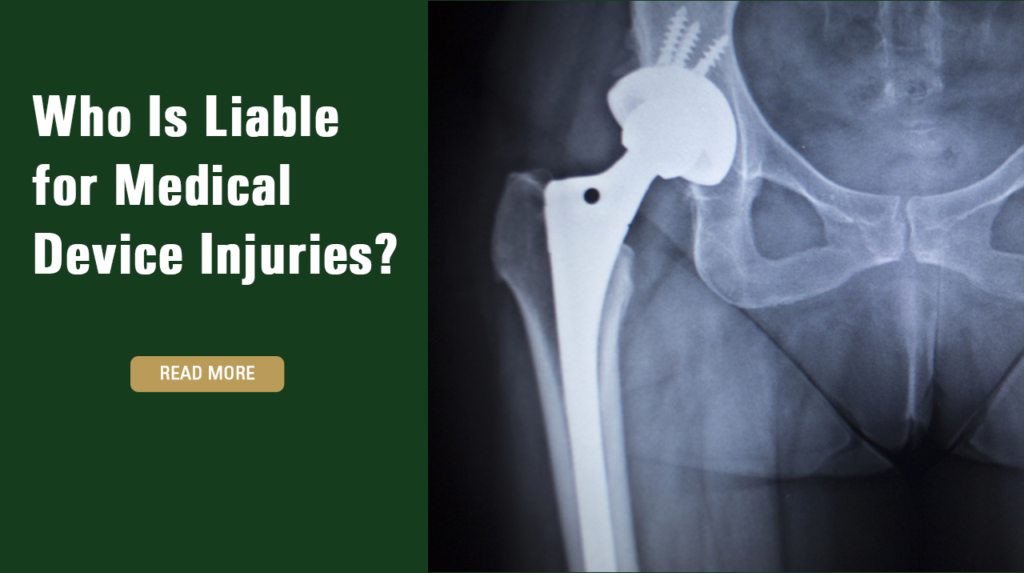Who Is Liable for Medical Device Injuries?

Many people rely on medical devices for a better quality of life. Companies that design and manufacture medical devices sometimes make mistakes during the designing or manufacturing process. When defects occur, patients who receive medical devices can be seriously injured or killed. Determining the responsible parties in a defective medical device claim can be difficult, making it important for you to seek help from an experienced product liability attorney at Raynes & Lawn. Our attorneys can evaluate your case and discuss its legal merits with you. We might be able to help you recover compensation for the losses you have suffered.
What are medical devices?
The Food and Drug Administration regulates medical devices and defines them as including instruments, machines, apparatuses, and other devices that contain components that are intended to treat, prevent, diagnose, or cure diseases or influence the structure or function of the body. These types of devices must be checked and maintained regularly to ensure they are working properly. Devices that are implanted in the body must be regularly monitored. However, a defective device can still injure a patient even if it is properly maintained and monitored.
Types of medical devices
There is a broad variety of different types of medical devices in use by people across the U.S. Devices that can place patients at a high risk of injury or death when they contain defects include the following:
- Breast implants used to reconstruct breasts or later their contours and might be filled with saline or silicone gel
- Defibrillators and pacemakers implanted to control the heart’s abnormal rhythms
- Intrauterine devices implanted to prevent pregnancy
- Hip implants for patients who undergo hip replacement surgery
- Hearing aids worn in or behind the ears to amplify sound and improve hearing
- Insulin pumps implanted to administer insulin for people with diabetes
- Heart stents to reduce the risk of heart attacks and keep the arteries open
- Transvaginal mesh implanted to treat prolapsed pelvic organs and urinary incontinence
Defective medical devices and common types of injuries
Defective medical devices can cause many different injuries, depending on how the device is used and its type. Some of the common types of injuries caused by defective medical devices include the following:
- Perforated tissues
- Organ loss
- Allergic reactions
- Infections
- Heart attacks
- Damage to the bones or tissues
- Strokes
- Permanent disabilities
- Severe pain
- Death
Liability in a defective medical device case
The Food and Drug Administration regulates medical devices to protect the public. While the FDA requires clinical trials and has a lengthy approval process, defective medical devices still are introduced and make their way through the FDA’s process. Many devices are recalled by various manufacturers each year. When a medical device is defective, the following parties might be potentially liable in a claim:
- Device designer
- Device manufacturer
- Device distributor
- Testing facility
- Medical supplier
- Doctor
- Pharmacy
- Medical facility or hospital
Determining liability in a defective medical device case
Liability must be determined before you can hold defendants responsible in a product liability claim. To prove this type of claim, you must first identify the defect. Defects can include design flaws, manufacturing defects, and marketing defects. They can happen because of mistakes during the designing or manufacturing process. They can also happen when a device deteriorates over time and causes injuries.
Once the defect has been identified, you will then need to determine all of the parties that are responsible for the flaw. You will need to show that the party had a duty of care it owed to you, it breached the duty, and the breach caused your injuries and resulting losses. The attorneys at Raynes & Lawn understand how to investigate defective medical devices to identify the defects and determine liability. We also understand the types of evidence that might be needed to prove our clients’ claims.
Damages in a defective medical device claim
The types of compensatory damages you might recover in a claim involving a defective medical device include the following:
- Past and future medical expenses
- Past lost wages
- Reduction in your ability to earn an income in the future
- Pain and suffering
- Emotional distress/mental anguish
- Disability
- Scarring/disfigurement
- Other damages
We can investigate your case and properly value it.
Call Raynes & Lawn
If you have been injured or have lost your loved one because of a defective medical device, you may be entitled to pursue compensation. Call the experienced product liability attorneys at Raynes & Lawn to learn more about your case at 1-800-535-1797.
For the general public: This Blog/Website is made available by the law firm publisher, Raynes & Lawn for educational purposes. It provides general information and a general understanding of the law but does not provide specific legal advice. By using this site, commenting on posts, or sending inquiries through the site or contact email, you confirm that there is no attorney-client relationship between you and the Blog/Website publisher. The Blog/Website should not be used as a substitute for competent legal advice from a licensed attorney in your jurisdiction.
For attorneys: This Blog/Website is informational in nature and is not a substitute for legal research or a consultation on specific matters pertaining to your clients. Due to the dynamic nature of legal doctrines, what might be accurate one day may be inaccurate the next. As such, the contents of this blog must not be relied upon as a basis for arguments to a court or for your advice to clients without, again, further research or a consultation with our professionals.
